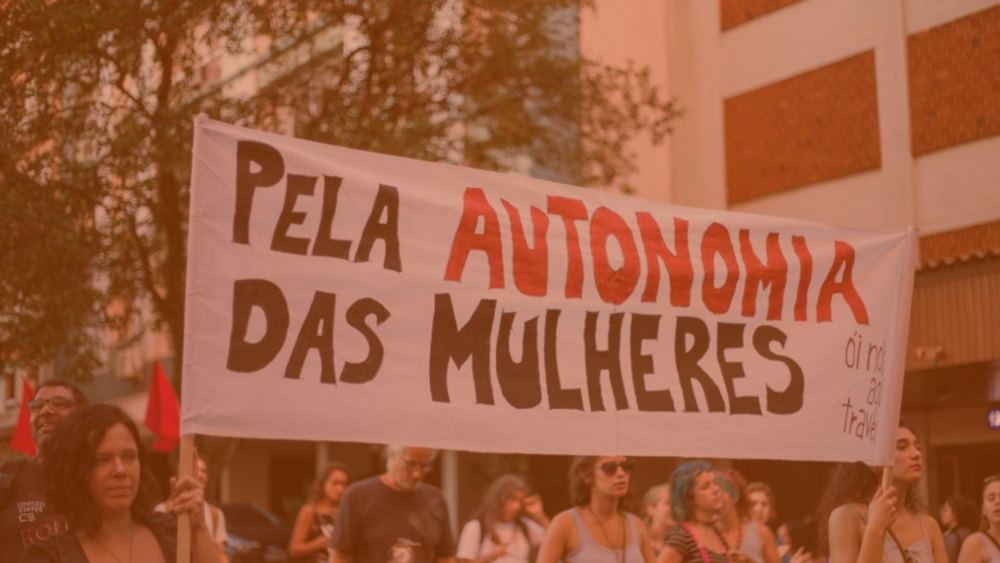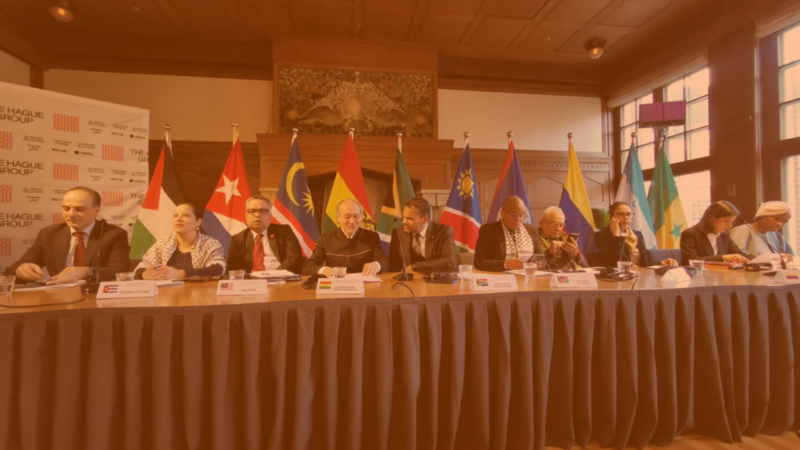We want this generation and the next ones to understand that the situation is very bad at the moment, and that we need everyone to put an end to this violation of our fundamental rights
A law passed in a referendum 17 years ago is flouted shamelessly on a daily basis. The result? What could be an agile medical procedure without any problems – especially psychological terms – becomes a race against time and the patriarchy. Before the scenario becomes more serious, we need to inform, warn, open up a conversation, speak in first person and exclude the word ‘guilt’ from our vocabulary.
Ana Patrícia Cardoso, founder of Associação Escolha
– Good afternoon, are you from Caldas da Rainha Hospital?
– Yes.
– I’d like to make an appointment for voluntary termination of pregnancy (VTP).
– Oh no, we don’t do it here.
– I beg your pardon? But I’m calling a public hospital, correct?
– Yes, but we don’t do it here. Go to a health center and they’ll refer you there.
(She hangs up abruptly and goes to Clínica dos Arcos on her own.)
Alfredo da Costa, Maternity Desk
– Good afternoon, I’d like to make an appointment for an VTP.
– We only do it for Lisbon residents.
– But I live in the district.
– No, no, you have to live here and have proof.
– What do I do now?
– Look elsewhere.
(Leaves MAC crying, calls Escolha. She dials Santa Maria Hospital and opts for surgery).
Castelo Branco
– I need help, they don’t do it here, even though the SNS website says they do. What can I do? I’m trying to call Covilhã (clinic), they don’t know how to help – they only say that I should call during those specific hours, which are two days a week, for an hour.
– We’ll help and look for alternatives so that you can do it on time. But you’ll have to travel.
(You can get an appointment in Figueira da Foz, in the district of Coimbra, two hours away).
The text could be entirely made up of cases, the kind that happen every day and nobody suspects. Associação Escolha, the first association to exclusively support VTP, is six months old with the deep conviction that it is necessary to change the current discourse around statistics and numbers and focus on what matters without fear – to speak in first person about the struggles and restrictions we face in order to carry out a right. Seventeen years of a law is a short time, you see. The same people who fought for the ‘No’ vote occupy positions of power – at the highest level of the nation – hospital management remains the same, the Catholic lobby and health professionals flood the guidelines of public establishments.
Abortion is a crime in Portugal
This expression is always followed by a question: “How can that be if I voted?”, “But I know someone who did it and wasn’t arrested, are you sure?”. The abortion law is in the penal code, which is highly discriminatory.
Let’s take a closer look at the legislation: Law no. 16/2007 defines the exclusion of illegality (crime) in concrete and restrictive circumstances for women (we use the gender represented in the law, knowing that the correct one would be pregnant person). If these guidelines are not met, they result in the crime of abortion.
Article 142(1)(e) makes it clear that “the termination of pregnancy carried out by a doctor, or under his direction, in an official or officially recognized health establishment and with the consent of the pregnant woman, is not punishable when (…) it is carried out, at the decision of the woman, in the first 10 weeks of pregnancy”. It also states that “the verification of the circumstances that make the termination of pregnancy not punishable is certified in a medical certificate, written and signed before the intervention by a doctor other than the one by whom, or under whose direction, the termination is carried out, without prejudice to the provisions of the following paragraph”. It is also obligatory for the woman to have a three-day cooling-off period before the procedure begins. In France, Luxembourg, Switzerland or Spain, a person never sits in the dock for abortion-related issues because abortion is discriminated against.
It is very important to understand the difference. In 2022, the Public Prosecutor’s Office reported that 15 investigations had been launched into the possible crime of abortion. In other words, it is for fear of facing the legal consequences of their choice that many women still turn to other countries to have an VTP, something that became a constant in the years before the law but which now makes no sense at all. According to an investigation by Expresso, more than 500 women went to two clinics on the border (Vigo and Badajoz) to terminate their pregnancies because they had passed the 10-week mark (one of the biggest restrictions in the law). We’re talking about a very high number for just one year and just two clinics. Just imagine the real number.
Another restriction that doesn’t make any sense is the fact that two doctors are needed: one for the prior consultation and one for the procedure. In what other medical treatment (excluding euthanasia) are we required by law to jump around? This issue leads to real territorial voids, because if there is only one doctor willing to perform VTP, the hospital can’t guarantee it. Take the case of the Azores, where people have to take a plane to come to the mainland. And this scenario brings us to the big issue that, if discussed seriously, would change the scenario for pregnant people: conscientious objection.
What are you objecting to? My freedom.
Article 6 of the law states: “Doctors and other health professionals are guaranteed the right to conscientious objection in relation to any act concerning the voluntary termination of pregnancy. Doctors or other health professionals who invoke conscientious objection in relation to any of the acts concerning the voluntary termination of pregnancy may not take part in the consultation provided for in Article 142(4)(b) of the Penal Code or in the monitoring of pregnant women that takes place during the period of reflection. Once conscientious objection has been invoked, it necessarily takes effect regardless of the nature of the healthcare establishments in which the objector works. The conscientious objection is expressed in a document signed by the objector, which must be presented, depending on the case, to the clinical director or the nursing director of all health establishments where the objector works and where voluntary interruption of pregnancy is practiced.”
Now let’s go from law to practice. When the law states that any health professional can be a conscientious objector, what happens on a daily basis is that nurses refuse to take blood from people who are going to have VTPs, anesthesiologists refuse, as do health technicians and, of course, doctors. Can we imagine the violence of someone entering a hospital thinking it’s a safe place and being denied care because of a personal and legal decision that has nothing to do with the professional? Perhaps it’s hard for us to imagine, but it happens on a recurring basis and with the refinement of judgments, brutality, disrespect and offenses. Since it is not stipulated that the public establishment can have conscientious objectors, but it is obliged to guarantee the medical procedure, what happens is what the cases illustrate: health units declare themselves objectors as a whole – something that is illegal but which results from a loophole in the law. According to the same report, a third of the recognised hospitals don’t do it and of the 55 health centres approached, none do. We’re talking about atrocious gender violence here.
Another point: the delivery of the signed document. This issue is not taken seriously and what we see is a selective conscientious objection that can lead a doctor to dissuade a pregnant person, taking advantage of a more fragile moment or judgments about the patient’s personal life. It happens a lot. “You already have children, you can have one more”; ‘well, at that age you already have your life cut out for that child’ – phrases repeated behind closed doors in doctors’ surgeries that should be punished with a formal complaint. The bills on the table are not specific enough in this area. The regulation of conscientious objection needs to go through an independent commission (i.e. one that doesn’t serve political interests or lobbies and isn’t made up of health professionals). The absence of the procedure in a given place should be subject to heavy fines and repercussions for the management, i.e. they must be obliged to have a full non-objecting team. Doctors who declare themselves conscientious objectors must comply with this position. Do we believe that this can happen quickly? Of course not. This is the most far-reaching change and one that touches on powers that have been in place for many years and that serve Catholic power, patriarchy and the stigma surrounding VTP. Let’s talk about the latter.
Shame on me? Never
This is important information that Escolha seeks to reinforce whenever it supports a person who wants to terminate a pregnancy:
– No one has to say why they want to have an VTP. You have to fill in a form with practical questions, but the reason for your choice is absolutely personal. Don’t get carried away by health professionals who like to make value judgments. “I want to have an VTP”, answer the questions and choose the method. That’s all you have to do.
– You can do it in any health establishment in the country. Article 3 of Ordinance no. 741-A/2007: “A woman may freely choose the official health establishment where she wishes to terminate her pregnancy, within the constraints of the applicable referral network.” Don’t fall for the idea that the area of residence is a false barrier.
– Many establishments object to the surgery, giving only pills. The law says that the woman can choose, but this is not always the case. Inform yourself on this point if, for some reason, you really want to have surgery.
– Whenever you are the victim of an offense, file a complaint. It is absolutely necessary for victims to understand that they have a voice.
– You don’t have to see the ultrasound at an VTP appointment. If they’re showing it to you, ask them not to, you really don’t have to see it. This is another cruel method of persuasion.
– There is no guilt in prioritising the life of the person who is pregnant and not the one who doesn’t exist yet. This word is not in the vocabulary of our future. Conscious motherhood, the one we defend, is a choice based on consideration, a concrete analysis of life and, above all, the will to be a mother at that moment. VTP doesn’t only happen in extreme situations, it happens more regularly in stable relationships, families with children, people who take precautions and these fail (yes, they fail). VTP happens when someone decides that now is not the time to bring a person into the world. A pregnancy is not a baby, it’s a human being for life, it’s too serious a decision not to be discussed and evaluated in depth.
– A woman’s place is not just in motherhood. Choosing to have an VTP isn’t denying something that comes naturally to us. These are beliefs generated by men to condition us to an overburdened secondary plane, focused only on others and not on you as the main character in your life. This fallacy must die. And we have to kill it ourselves.
– Escolha sees VTP as an act of freedom, of self-love, a legal medical procedure that has to be carried out with respect. It’s not easy, it shouldn’t be taken lightly, it deserves to be experienced in peace. We want this generation and the next generations to understand that the scenario is very bad at the moment – as reported above – and that we need everyone to put an end to this violation of our fundamental rights. We are here to stay.
Do you want to be informed of DiEM25's actions? Sign up here















